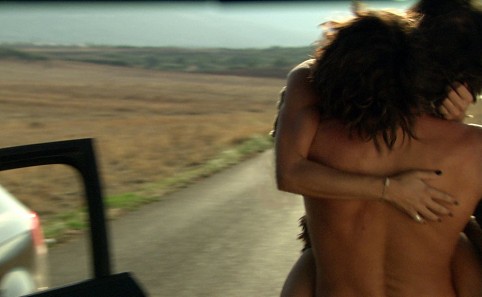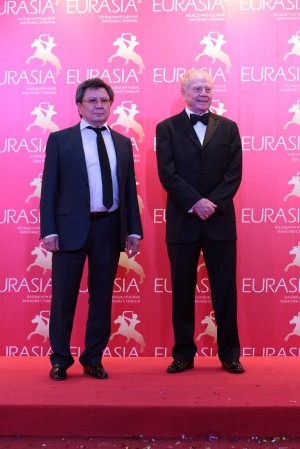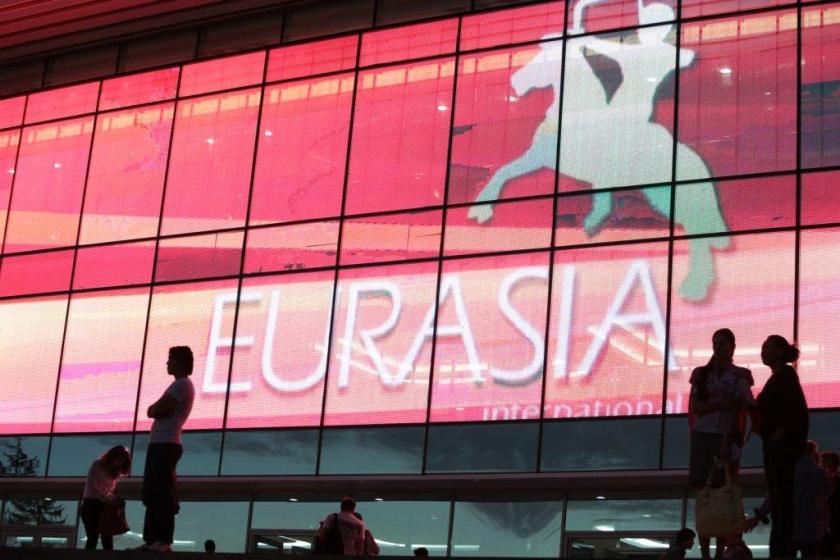Almaty may have lost its capital status to Astana in 1997, but this city of 1.6m inhabitants, about nine percent of the country's population, remains the commercial and cultural hub of Kazakhstan. The Eurasia Film Festival was first held here in 1998 with the support of the Filmmakers Union as a forum for movies from the CIS and Baltic countries. Though initially intended as an annual event, some years there hasn't been a festival at all - in 2009 it officially closed only to resume again in 2010. Prior to 2011 the program leaned heavily towards Central Asian films, but last year more European movies were included. Increasingly, this event is now living up to its title.
Although the idea of Eurasia was first formulated by Russian academics at the end of the 19th century, the notion that central Asia was the connecting link between east and west didn't gain popularity again until it became the cultural policy of recently independent countries Kazakhstan and Kyrgyzstan in the second half of the 1990s, according to film academic and critic Gulnara Abikeyeva who is also Artistic Director of the Eurasia IFF. Abikeyeva has written five books on central Asian cinema and proclaimed that Kazakhstan was always very adaptive to various cultural influences due to its location and its nomadic people.
Two 'Special Event' screenings really made apparent the ambitions of the Kazakhstan film industry
With the country now an increasingly popular choice for foreign business investment, the Eurasia IFF is likewise conspicuously trying to reach out to the world with some lavish hospitality and high profiles guests, which in the past have included Kevin Costner, Gerard Depardieu, Sigourney Weaver and (last year) Juliette Binoche. This year's red carpet opening ceremony at the Kazakhstan Palace of the Republic was a spectacle to compete with the best A-list film festivals, with large, excitable local crowds central to the atmosphere.
Guests this year included American film and television actor Dennis Haysbert, who presented legendary Kazakhstan actor Asanali Ashimov (both pictured below right) with a special award to mark his 75th birthday. A special section of the festival was devoted to four of Ashimov's best films, including End of Ataman, which was honoured with the State award of Kazakh SSR in 1972.
 Also present were many Russian film and stage actors, as well as German director Wolfgang Petersen (famous for 1981 WW2 drama Das Boot), who was chairman of the Jury of the International Competition. Completing the jury were four international award winning directors: Denis Tanovic (Bosnia and Herzegovina), Luy Arcenas (Philippines), George Ovashvili (Georgia) and local director Amir Karakulov (Kazakhstan) whose latest film Virtual Love was the special screening of the opening ceremony.
Also present were many Russian film and stage actors, as well as German director Wolfgang Petersen (famous for 1981 WW2 drama Das Boot), who was chairman of the Jury of the International Competition. Completing the jury were four international award winning directors: Denis Tanovic (Bosnia and Herzegovina), Luy Arcenas (Philippines), George Ovashvili (Georgia) and local director Amir Karakulov (Kazakhstan) whose latest film Virtual Love was the special screening of the opening ceremony.
As for the sections of the festival, films from Kazakhstan made up much of the program, not least in its own "Dynamic Kazakh Cinema" section which comprised of 11 films released in Kazakhstan from September 2011 to September 2012, including seven premieres (three first-time directors) and two television film premieres. Notable amongst these was Kausar, having its Kazakhstan premiere after participating in the Busan and Goa film festivals in 2011. The debut film of theatre director Gulsina Myrgaliyeva it was shot in the varied landscapes of Mangistau, western Kazakhstan and tells the story of a young girl not wanting to bear a child as it was conceived through violence, but subsequently has second thoughts. The variety and quality of the program was well received in the festival's four screens at Almaty Towers. The full screenings somewhat belied the fact that the number of seats in each cinema was too small, something the festival will have to address if its popularity continues to grow.
 Two "Special Event" screenings, however, really made apparent the ambitions of the Kazakhstan film industry. Myn Bala: Warriors of the Steppe (pictured above, directed by Akan Satayev) is a $10m budget historical action adventure which was released in Kazakhstan in early May and grossed $1m in its opening weekend, breaking the previous record set by Satayev's Racketeer in 2007. Inspired by historical facts, the film focuses on a group of teenage rebels who fight against the ferocious Jungar Mongols occupying their country in the 1720s. To date it has already made $2m at the Kazakh box ofiice and is Kazakhstan's entry for next year's Academy Awards Best Foreign Film section. On the other hand, Book of Legends: Mysterious Forest (directed by Akhat Ibrayev) takes its inspiration from the literary legends Chronicles of Narnia and Lord of the Rings, but the director set himself a task to create the first Kazakh film with majority computer graphics. Extremely high concept and ambitious, it is the first Kazakh film to be made with two thirds CGI and animation.
Two "Special Event" screenings, however, really made apparent the ambitions of the Kazakhstan film industry. Myn Bala: Warriors of the Steppe (pictured above, directed by Akan Satayev) is a $10m budget historical action adventure which was released in Kazakhstan in early May and grossed $1m in its opening weekend, breaking the previous record set by Satayev's Racketeer in 2007. Inspired by historical facts, the film focuses on a group of teenage rebels who fight against the ferocious Jungar Mongols occupying their country in the 1720s. To date it has already made $2m at the Kazakh box ofiice and is Kazakhstan's entry for next year's Academy Awards Best Foreign Film section. On the other hand, Book of Legends: Mysterious Forest (directed by Akhat Ibrayev) takes its inspiration from the literary legends Chronicles of Narnia and Lord of the Rings, but the director set himself a task to create the first Kazakh film with majority computer graphics. Extremely high concept and ambitious, it is the first Kazakh film to be made with two thirds CGI and animation.
The "Central Asia Panorama" section featured seven films which represented the best from the region outside Kazakhstan, a region where the industries still have a long way to go in terms of consistent production quality. Also featuring a film from Azerbaijan, Stepnyak (directed by Shamil Aliyev, 2012), the paradoxes of the film output from these countries makes for interesting reading. For instance, in Uzbekistan about 60 full-length fiction films are made each year, in Kyrgyzstan it is about 40, with Tajikistan numbering twenty. These are generally low budget genre films popular with their local audiences. The film critics of the region, however, fully realise that with the growth in film production the quality suffers. This section at Eurasia provided an antidote to this trend: the 2011 Uzbekistan production The Mute House, directed by Elkyn Tuychiyev, is one of the vanguards of the new generation of Uzbek cinema, as is The Day of Truth (directed by Dzhasur Iskhakov, 2012), a film which had its international premiere at the Golden Apricot IFF in Yerevan, Armenia.
 This year's International Competition consisted of 12 films, with only two from Europe. A third, Thomas Vinterberg's The Hunt (starring Mads Mikkelsen), was withdrawn as its Russian distributor was unable to deliver a print that served the Eurasia festival's guidelines. It was replaced somewhat maladroitly by a film from Kyrgyzstan already showing in the "Central Asian Panorama" section; Kyrgyzstan, I Love You, itself an almanac of five short films somewhat cobbled together to form a feature. Of the other European features, the German-French-Polish Elles (directed by Malgorzata Szumowska and starring Juliette Binoche) had screened at this year's Berlin Film Festival, while The City of Children (pictured above, directed by Yorgos Gikapeppas) gained the title of the Best Greek Film of 2011 at the prestigious Greek Film Festival in Thessaloniki. The other nine films in the International competition consisted of three from Asia (South Korea, India, Turkey), two from the CIS (Russia and Ukraine) and four more from Central Asia (Russia-Tajikistan, Uzbekistan and two from Kazakhstan).
This year's International Competition consisted of 12 films, with only two from Europe. A third, Thomas Vinterberg's The Hunt (starring Mads Mikkelsen), was withdrawn as its Russian distributor was unable to deliver a print that served the Eurasia festival's guidelines. It was replaced somewhat maladroitly by a film from Kyrgyzstan already showing in the "Central Asian Panorama" section; Kyrgyzstan, I Love You, itself an almanac of five short films somewhat cobbled together to form a feature. Of the other European features, the German-French-Polish Elles (directed by Malgorzata Szumowska and starring Juliette Binoche) had screened at this year's Berlin Film Festival, while The City of Children (pictured above, directed by Yorgos Gikapeppas) gained the title of the Best Greek Film of 2011 at the prestigious Greek Film Festival in Thessaloniki. The other nine films in the International competition consisted of three from Asia (South Korea, India, Turkey), two from the CIS (Russia and Ukraine) and four more from Central Asia (Russia-Tajikistan, Uzbekistan and two from Kazakhstan).
 Headed by Wolfgang Petersen (pictured left) the International Competition Jury announced at the closing ceremony (also at the Kazakhstan Palace of the Republic) that it decided not to award a Grand Prix for best film, with its $20,000 prize money. As a compromise, the best director award was given to two films - Elles and Future Lasts Forever by Turkish director Özcan Alper.
Headed by Wolfgang Petersen (pictured left) the International Competition Jury announced at the closing ceremony (also at the Kazakhstan Palace of the Republic) that it decided not to award a Grand Prix for best film, with its $20,000 prize money. As a compromise, the best director award was given to two films - Elles and Future Lasts Forever by Turkish director Özcan Alper.
The award for best actress went to Anais Demoustier, one of the protagonists of Elles. Russian director Alexey Mizgerev's Convoy received the prestigious international critics' FIPRESCI Award, with Kazakh-born actor Azamat Nigmanov present to pick up the award on behalf of his director. Shortly after he returned to the stage to pick up the prize for best actor, this following his best actor prize at the Kinotavr "Open Russian Cinema" Festival in Sochi in June. The NETPAC Jury (Network for the Promotion of Asian Cinema) awarded their prize to Kazakh director Darezhan Omirbayev's Student for “its narrative, at once both simple and complex” and the film's “simple cinematic strength". Omirbayev's film premiered in Un Certain Regard in Cannes and the 54-year-old director can count on Jean-Luc Godard as one of his advocates.
The awards ceremony was followed by a further screening of the Kazakh Oscar entry. It became clear that Myn Bala: Warriors of the Steppe is not only the nation's flagship film for the near future. Like the Eurasia International Film Festival itself, it is also a clear statement of the determination of Kazakhstan's movie industry to make a splash far outside the confines of its homeland.















Add comment